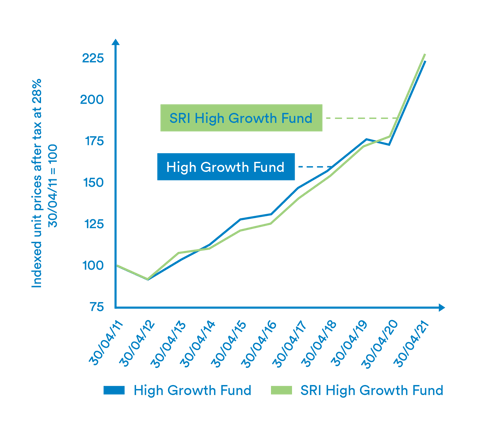A 2020 survey by RIAA and Mindful Money highlighted that over three-quarters of New Zealanders expect their KiwiSaver investment funds to be managed responsibly and ethically1.
Yet, only 59% of Kiwi investors would consider investing ethically only if the returns were as good as a standard fund2.
So, what holds investors back from choosing to invest in ethical funds? It seems there’s still a widely held perception that ethical funds don’t perform as well as standard funds. The belief is that by choosing to invest in an ethical fund that aligns with your personal values, you could be missing out on greater returns than if you invested in a standard fund.
The ethical trade-off

Fortunately, it’s no longer a trade-off between investing in alignment with your personal values or getting good returns. Many investment funds with an ethical focus are generating similar returns to standard funds.
In fact, over the last 10 years, Booster’s socially responsible investment (SRI) funds have performed as well as – if not better – than our non-SRI funds3.
As the demand for ethical investment options continues to grow, so too does the value and performance of ethical investment funds.
Do exclusions affect a fund’s performance?
There are many factors that influence a fund’s performance, not just if the fund avoids investing in specific industries or not. Just because companies aren’t included, it doesn’t necessarily mean that returns are lost as a result. Nor does choosing to invest in a good business necessarily mean better returns.
For example, many standard investment funds hold shares in oil companies. The oil price drop in March 2020 saw the value of shares in oil companies drop significantly, which would have contributed to lower returns for many funds that hold these shares. Even though there was an initial drop in value, Booster’s SRI funds held up relatively well during the same time compared to other funds – as the SRI funds exclude investments in oil companies.
Of course, it can also work in reverse. The markets for controversial industries such as oil, nuclear power production and other ‘sin-stocks’ may have a good run (such as the sharp rise in the oil price since March 2020), where investments in ethical companies may be adversely affected by market-specific forces.
A growing movement
Deciding to invest in ethical funds is a growing investment choice for many KiwiSaver investors. As of 31 March 2020, KiwiSaver investors had over $252 million invested in socially responsible investment funds4. That’s up from $163m in 2019 – growth of 54.9%!
And, choosing to invest ethically is delivering results. In fact, Booster’s SRI Balanced and SRI High Growth funds are among the top performers in Morningstar’s KiwiSaver survey for the 3 years to 31 March 2021.
Booster’s SRI Balanced Fund returned 9.9% p.a. over the 3 years to 31 March 2021, while our SRI High Growth Fund returned 14.1% p.a. (ranking 2nd highest in Morningstar’s Aggressive category) in the same period5.
Which just goes to show that becoming an ethical investor is no longer a trade-off between your personal values and getting good returns.
Find out more about Booster’s socially responsible investment funds.
1Responsible Investment – New Zealand Survey 2020, Q6
2Responsible Investment – New Zealand Survey 2020, Q17
3Based on year by year returns for Booster KiwiSaver Scheme SRI High Growth and High Growth Funds over the last 10 years. (Returns after fees and PIR tax of 28% as at 30 April 2021).
4FMA KiwiSaver annual report 2020, p 20
5Morningstar KiwiSaver Survey, March Quarter 2021. Returns are after the deduction of all fees but before tax.

